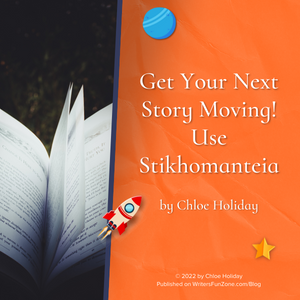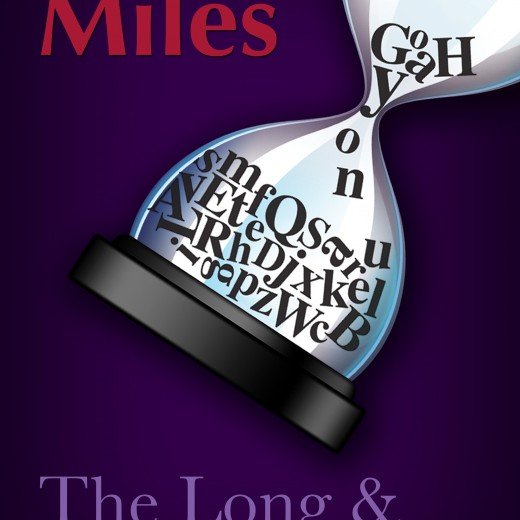Get Your Next Story Moving! Use Stikhomanteia, The Ancient Greek Divination Technique! by Chloe Holiday
 Today we welcome a new guest writer to Writer’s Fun Zone, Chloe Holiday who is stopping by to chat with us about “Get Your Next Story Moving! Use Stikhomanteia, The Ancient Greek Divination Technique!” Enjoy!
Today we welcome a new guest writer to Writer’s Fun Zone, Chloe Holiday who is stopping by to chat with us about “Get Your Next Story Moving! Use Stikhomanteia, The Ancient Greek Divination Technique!” Enjoy!
***
Writer’s block comes in all flavors but the absolute worst has to be experiencing gridlock at the start.
A completely blank page– and mind!– mocks you.
If you could only get going, it would prime the pump, and words would flow, but right now, you might as well be in the Sahara of Prose.
Yet the opposite can be just as bad: a cascading deluge of ideas all clamoring for attention, enough that a writer can be swept away by indecision.
This happened to me when I first decided to write my first Romance. My brain swirled with plots, too many to reel in.
Where to start?
After an embarrassing number of days getting nowhere, I finally in desperation wrote down all the tropes and character types on slips of paper, put them in bowls, for the storyline, hero, and heroine, and drew a few out: Rich Foreign Alpha Male, Repressed Young Woman, Workplace Romance, and Travel Romance.
All of a sudden, I had a starting point.
The technique might sound limiting, but instead was weirdly freeing. I could shut up my inner critic with “the Fates decree it” and get on with writing instead of second-guessing myself.
It was the barest of skeletons, yet it became Helios—and ultimately a series—which received reviews like this:
“Holiday managed to walk the line of a harlequin romance while offering bits of a third wave feminism into the mix – it would make for a fascinating literary study. The writing is crisp, fun to read, and perfectly crafted toward the ideal audience of this type of book. It fits the one-sitting read that many romances hang their hats upon, and offers that transportive, foreign fling that can whisk readers into another world. Also – can’t forget this – how deliciously scandalous!” –Writer’s Digest
Little did I know at the time that I had employed the ancient Greek divination technique of Stikhomanteia (STEEK-ho-MAN-tee-uh), which involves using the written word to help clarify the future, whether through drawing slips of paper or opening a book to a random passage.
One other benefit was the way learning about this helped shape another novel.
Stikhomanteia
The practice of divination dates from prehistoric times, but the Greeks were into it, big time.
There were two broad classes of practitioners:
- officially-sanctioned oracles, who were installed in a given location, supported by a priesthood and sacrifices by those who made pilgrimages to seek their advice.
- independent seers, who were be hired by an individual ruler or military campaign.
Though divination was denounced by later religions and skeptics, it served as a way to give advice to state and military leaders, and as propaganda, to bolster confidence and support from the public as well as the superstitious soldiers under a general’s command.
Unsurprisingly, the hired seers were less likely to contradict a leader’s chosen route—or suggest they sacrifice their own child—instead, offering prophecies that supported the leader’s decisions, though the prophet’s words were often ambiguous.
Over 500 prophecies of the Pythi, the most famous oracles who served Apollo at Delphi, have survived the centuries.
Divination
There were several methods through which the prophecies were obtained.
There were two main methods for divination.
Enthusiasm or possession, in which the gods spoke through the ravings or dreams of the oracle.
To achieve this the priestess at Delphi chewed bay (laurel) leaves or dipped their nails in laurel oil, drank water from a sacred stream, and sat on a tripod over a chasm which emitted toxic vapors, while another stood ready to take down her mind-altered speech.
Even today, a common Greek idiom for “I have no idea” is “Shall I smell my fingers?” which refers to the scent of the laurel oil which helped induce the prophetic trances so long ago.
The second method, extispicy, involved the examination of the entrails of a sacrifice brought to the priests. Conviently the meat was used for the priesthood later.
Other forms of divination included:
- cleromancy— the use of dice or lots
- astragalomancy— The use of carved sheep knucklebones, hydromancy— the use of water
- pyromancy– the use of fire
- thriai– the use of pebbles
- augury– predictions based on animal behavior, especially birds
- tasseography– the reading of dregs.
Submerged Hopes, the third book in my series, The Helios Greek Romances, contains a scene in which the hero offers to tell the fortune of the heroine by reading the dregs of her coffee cup. Nick, who knows enough about the culture to seize the chance, predicts she’ll fall for a man who just happens to look a lot like him.
Nick used it with Greek coffee, but tea leaves or even wine dregs will work.
Tasseography
To do a proper Greek coffee reading, one must obtain strong brew with thick dregs, preferably made in a long-handled pot called a briki. The fortune-seeker should enjoy the coffee while thinking about their questions or worries.
When only the dregs remain, the fortune-teller takes the cup, and, holding the top tilted away to prevent splashing, rotates the cup three times clockwise to spread the sludge, dumps the excess out on the side with the handle, and sets it upside down on a napkin to drain for a few minutes.
The cup is then examined for shapes—animals, symbols, letters, landmarks—with an open mind.
The bottom of the cup represents the past, the middle indicates the present, and the top portion shows what is to come. As in days of old, the predictions are open-ended and vague, which allows wiggle room as well as hope.
The surviving Delphic predictions are fascinating for anyone who loves history.
My prediction? Stikhomanteia might be just the thing to get you moving!
Listen to my audio below:
***
About The Author
 Chloe is a military physician-turned-novelist who writes the things she loves to read: steamy, fun stories about ordinary people in extraordinary circumstances, smart women and men who aren’t jerks and friendships, whether it’s close women or a good bromance. She wants all the feels: the thrill of a smoldering gaze or the barest brush of fingertips, the shocked gasp at the underhanded villain, the angst of heartbreak, the joy of reunion, and of course, happily ever after!
Chloe is a military physician-turned-novelist who writes the things she loves to read: steamy, fun stories about ordinary people in extraordinary circumstances, smart women and men who aren’t jerks and friendships, whether it’s close women or a good bromance. She wants all the feels: the thrill of a smoldering gaze or the barest brush of fingertips, the shocked gasp at the underhanded villain, the angst of heartbreak, the joy of reunion, and of course, happily ever after!
Chloe enjoys delivering a sneak peek into intriguing scenarios, drawing from her background (military personnel, medicine, aviation) as well as other cultures like Greece. A bit of danger always gets her going, so many of her Romances have a suspense subplot.
She hates to read the same old thing, with only the names and places changed, so her goal is to bring folks a fresh, fun, new story every time, with NO CLIFFHANGERS!
More than anything, she wants to craft a rollicking, great story readers can’t put down, one where love prevails in the end, one that will whisk people away from their own tribulations.
Come join her at http://www.chloeholiday.com! and sign up for her newsletter to download a free copy of Finders, Keepers.
You can also find her here:
Goodreads: https://www.goodreads.com/author/show/19579299.Chloe_Holiday
Facebook: https://www.facebook.com/Chloe-Holiday-Writer-102345001394478
Bookbub: https://www.bookbub.com/authors/chloe-holiday
Amazon page: https://www.amazon.com/Chloe-Holiday/e/B0875SGW6J?ref
Chloe’s works:
Finders, Keepers (audiobook here)
A Boy & his Dog (audiobook here)




[…] Get Your Next Story Moving! Use Stikhomanteia, The Ancient Greek Divination Technique! by Chloe Holi… […]